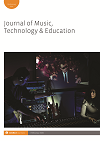-
f Technology’s role for achieving creativity, diversity and integration in the American undergraduate music curriculum: Some theoretical, historical and practical perspectives
- Source: Journal of Music, Technology & Education, Volume 11, Issue 1, Aug 2018, p. 5 - 36
-
- 01 Aug 2018
Abstract
This article provides an overview of six years of research with the goal of identifying key music technology competencies seen as essential for the undergraduate music major by tertiary music professors largely in North America. The results of the research are viewed from multiple dimensions: ‘pillars’ of curriculum as defined by a recent College Music Society (CMS) (United States) task force report, the diffusion of innovative technology historically within music instruction and general categories of music study within the tertiary curriculum. The authors share the results of five separate studies over a six-year period beginning in 2011 dedicated to the identification of core technology competencies for all undergraduate music students. Total responses included 772 returned questionnaires across the five studies that probed key competencies and their role in the instructional process. Consistent support for eleven key competencies was identified. The article concludes by offering a number of creative teaching scenarios across the tertiary curriculum for supporting the eleven competencies identified by participants in the research studies. The results from the research along with the overarching curricular issues presented may apply not only to tertiary music study in North America, but to the broader, international landscape of music curriculum innovation and reform.


